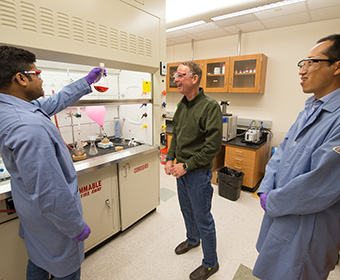UTSA professor receives grant to support sunlight-harvesting research

Kirk Schanze and his graduate students work in one of his two sunlight research laboratories.
(May 8, 2017) -- Kirk Schanze, Robert A. Welch Distinguished University Chair in Chemistry at The University of Texas at San Antonio (UTSA), has received a $448,211 grant from the National Science Foundation to support his research in converting sunlight to chemical energy.
The Schanze Research Group at UTSA is focused on the interaction of light with molecules, polymers and materials. Currently, Schanze and his students are centering their work on light emission and how converting light into energy could be used in applications like solar cells and fuels.
"We make new light absorbing molecules and polymers and then we characterize what happens to their molecular structure when the absorb light," Schanze said. "We want to understand how fast the light is absorbed and what happens directly afterward because that tells us something about how the energy is being used and where it goes."
He and his students are modeling their artificial light conversion on natural photosynthesis. When plants convert sunlight into energy to feed themselves, a process occurs that separates positive and negative electron charges on the molecules. This is called charge transfer, and it's an important process in energy conversion.
In essence, charge transfer is the step when light energy is converted into stored chemical energy. With this new grant, Schanze will look deeper into this process. The group hopes to find molecules or a polymer which optimize the light to chemical energy conversion process.
"We make artificial systems in our synthesis work and they undergo similar types of processes to what happens in plant photosynthesis," he said. "We're working on trying to understand those mechanisms and mimic the kind of conversions that are happening in nature."
The end goal for Schanze is knowledge, so that other researchers are able to build upon his work and eventually develop solar fuel.
"Without this important step, we'll never accomplish the goal of making efficient artificial photosynthesis, which is very important for mankind," he said.
Further down the road, Schanze predicts solar fuel could be a large part of the energy future of the United States and the world.
"We need to create pathways toward the production of energy and fuels in ways that are carbon-neutral and independent of the needs of non-renewable resources," he said. "Everything we're doing here is in service to one day accomplishing that goal."
UTSA is ranked among the top 400 universities in the world and among the top 100 in the nation, according to Times Higher Education.
-------------------------------
Learn more about the Schanze Research Group.
Learn more about the UTSA Department of Chemistry.
Connect with UTSA online at Facebook, Twitter, YouTube, Instagram and LinkedIn.
Events
Move In To COLFA is strongly recommended for new students in COLFA. It gives you the chance to learn about the Student Success Center, campus resources and meet new friends!
Academic Classroom: Lecture Hall (MH 2.01.10,) McKinney Humanities BldgWe invite you to join us for Birds Up! Downtown, an exciting welcome back event designed to connect students with the different departments at the Downtown Campus. Students will have the opportunity to learn about some of the departments on campus, gain access to different resources, and collect some giveaways!
Bill Miller PlazaJoin us for an intimate evening of cocktails, conversation, and culinary inspiration with Pati Jinich, Emmy-nominated chef and James Beard Award-winning author. Enjoy light bites and signature drinks in the warm, modern setting of Mezquite as Pati connects with guests over her passion for Mexican cuisine and storytelling.
Mezquite Restaurant in Pullman Market, 221 Newell Ave., San Antonio 78215From inspired courses to thoughtful pairings and a rich sense of community, the Ven a Comer Signature Dinner is a night of shared meals, shared stories, and unforgettable flavor.
Stable Hall (Pear Brewery), 307 Pearl Pkwy, San Antonio 78215Come and celebrate this year's homecoming at the Downtown Campus with food, games, giveaways, music, and more. We look forward to seeing your Roadrunner Spirit!
Bill Miller Plaza

